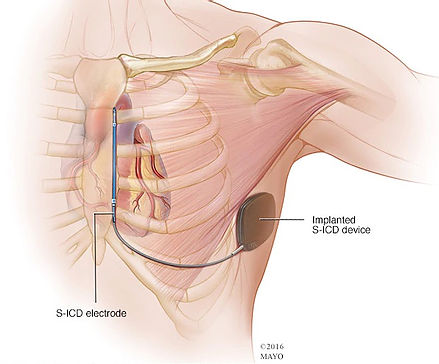


Call us for any question
(720) 893-5000Clinic Contact
(720) 772-8040805 E 144th Ave suite 200
Thornton, CO 80023

Home / Procedures / Cardiac / Implantable Cardioverter Defibrilla



An implantable cardioverter defibrillator (ICD) is an electronic device that constantly monitors your heart rhythm. When it detects a very fast heartbeat (ventricular tachycardia), abnormal heart rhythm (arrhythmia), or a chaotic heartbeat that keeps your heart from supplying enough blood to the rest of your body (ventricular fibrillation), the ICD delivers energy to the heart muscle. This causes the heart to beat in a normal rhythm again.
ICD reduces the risk of dying if the lower chambers of your heart (ventricles) go into a dangerous rhythm and stop beating effectively (cardiac arrest).
Ventricular tachycardia (very fast heartbeat) and ventricular fibrillation (chaotic heartbeat) are two life-threatening heart rhythms. These conditions can be fatal if not treated properly.
Your doctor may recommend an ICD if you’ve had at least one episode of these heart rhythms or are at high risk of developing these types of heart rhythms.
You’re a candidate for an ICD if you’ve had sustained ventricular tachycardia, survived a cardiac arrest, or fainted from a ventricular arrhythmia. You might also benefit from an ICD if you have:
When you have a rapid heartbeat, the wires from your heart to the device transmit signals to the ICD, which sends electrical pulses to regulate your heartbeat. Depending on the problem with your heartbeat, your ICD could be programmed for the following therapies:
The pain from this therapy usually lasts only a second. There should be no discomfort after the shock ends.
Usually, only one shock is needed to restore a normal heartbeat. Sometimes, however, you might have two or more shocks during a 24-hour period. Frequent shocks in a short time period are known as ICD storms. If you have ICD storms, you should seek emergency care to see if your ICD is working properly or if you have a problem that’s making your heart beat abnormally.
If necessary, the ICD can be adjusted to reduce the number and frequency of shocks. You may need additional medications to make your heart beat regularly and decrease the chance of an ICD storm.
An ICD can also be programmed to perform other functions, which include:
